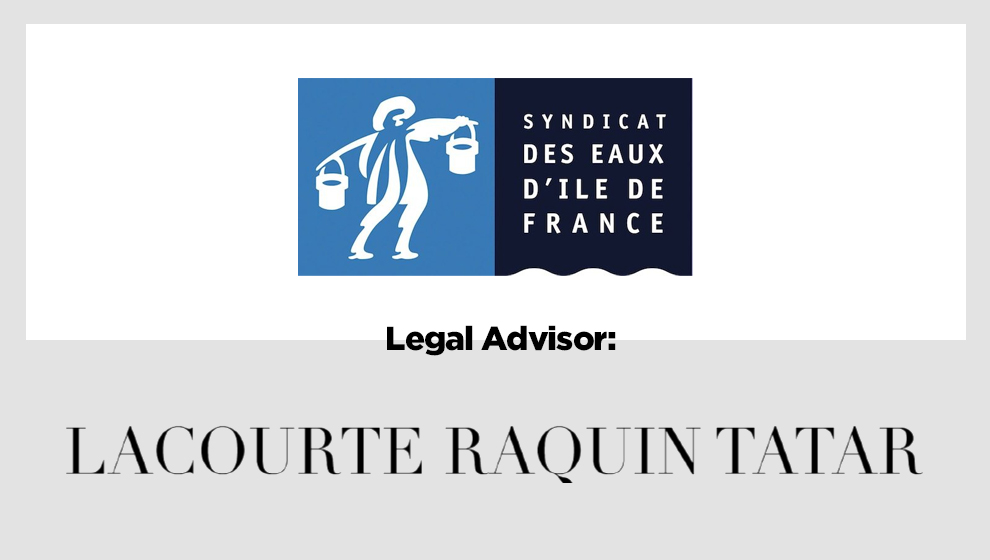Syndicat des Eaux d’Ile-de-France (SEDIF) has completed the procedure for awarding the new concession contract relating to the management of the public drinking water service in Ile-de-France.
The contract will last 12 years and is worth around EUR 4.3bn to cover the supply of drinking water to over 4 million people for over EUR1 billion in investments to produce clean, limescale and chlorine free water.
Lacourte Raquin Tatar supported SEDIF at all stages and defended their interest in the context of disputes which proceeded the signing of the contract and under the terms of which the Paris administrative court and the Council of the state validated in all respects of awarding the concession.
The team was led by Benoit Neveu and composed of Xavier de Lesquen, Marine Hue, Romain Meresse, Claire McDonagh and Arthur Pierre.
Q&A with Benoit Neveu

Benoit, can you walk us through your strategic plan when leading the team on this project and why this plan was the best way to approach the client’s demands?
For SEDIF, this project has significant economic, technical, environmental but also legal implications, considering the complexity of the contract and the high risks of litigation.
Our goal has always been to provide high-level legal advice to meet those challenges, with precision, availability, and adaptability. I was personally involved on a daily basis, leading the team and the relation with the client, which was made easier as SEDIF also set up a tight and efficient dedicated team, with a limited number of highly committed contacts.
The success of the project greatly relies on the planification of tasks and the anticipation of challenges, but also on the team’s capacity to adapt, daily, to the client’s needs. Emergencies and last-minute changes are quintessential for this type of project, and our team knows exactly how to deal with them.
How did you and your team pull your best and most suited assets and skills to work on this acquisition, what valuable skills did each member bring to the board?
We set up a dedicated team, highly experienced in public contract law and composed of lawyers who have great knowledge of water public services, the economic operators that can provide them as well as the specific legal issues of this sector. We used our experience working on previous concession contracts for the supply of drinking water, notably in Toulouse, Bordeaux, Lyon, Lille or Marseille.
For this project, we have continuously taken advantage of our strong litigation practice in public contract law, which has allowed us to anticipate criticism of the award process and provide tailored advice, even when the law was silent. We also benefited from the invaluable support of my partner Xavier de Lesquen, a former administrative magistrate. Our expertise has been particularly valuable in preventing conflicts of interests, advising the client on the information to be communicated to the economic operators, and more generally throughout the negotiations.
In many cases, there are no obvious nor absolute answers to the questions which bring clients to their lawyer. For this reason, beyond the mere analysis of the current state of the law, our dedicated team of lawyers on this project has systematically looked for, found, and sometimes even designed the most appropriate solutions to meet the needs of our client, always keeping legal security as a priority.
Finally, this type of projects requires helping the client to take decisions while taking into account numerous parameters and to reconcile various point of views. I believe that my experience as a mediator helped our client in the management of the project, especially as communication is a key factor of success, as is listening to the client and reformulating their needs to answer them as best as possible.
Can you tell us about the final stages of this concession being awarded and whether any challenges arose which had to be addressed in the pressure of the last stretch?
There was an incident which changed the parameters of the final stages of the concession award procedure. As a result of an IT issue, part of an economic operator’s bid was disclosed to a competitor. This breach of confidentiality has led SEDIF to stop the negotiations and award the contract based on intermediate bids submitted before the IT issue. This decision was not an easy one to take, and we worked closely with SEDIF on all the possible solutions available to identify and evaluate the risks of each solution.
The decision to attribute the contract on the basis of intermediate bids has been challenged by one of the economic operators through a precontractual remedy, before the award of the contract. We successfully represented SEDIF before the Paris Administrative Court, which ruled that SEDIF’s decision was compliant with the French concession contract rules, and especially with the principle of equal treatment between the candidates. This ruling was confirmed by the French Council of State, which ruled that SEDIF had taken the best decision in the specific circumstances of the case. We are proud to have successfully advised SEDIF and defended this solution, even considering the pressure surrounding it.
Once the decision to continue the procedure on the basis of the intermediate bids was confirmed, we advised SEDIF on the analysis of these bids and on the adjustments of the concession contract, which was particularly challenging as it was impossible to continue discussions with the economic operators. A considerable amount of work was therefore required before SEDIF could issue the decision to select the concessionaire.
This choice was followed by another precontractual remedy, through which the unsuccessful economic operator tried to dispute the concession award procedure on multiple grounds. However, the Administrative Court rejected the claims and fully confirmed the legality of all aspects of the concession award procedure. Considering our involvement at every stage of this procedure, we received this decision with great satisfaction.
Following this litigation, the contract was finally signed, but not without a long series of obstacles and several long months of constant mobilisation on our part.
As this is such a significant project, providing clean water to so many inhabitants, how does this project align with the values of Lacourte Raquin Tatar?
The SEDIF project is an ambitious one which perfectly matches the type of cases that our firm is keen on, for at least three reasons.
The first reason is that this project required strong legal engineering, and the provision of legal advice with high added value, which perfectly matches the type of services that we make a priority to provide to our clients. Indeed, we always strive to bring a creative and tailored outlook to every situation, to obtain the best possible results. In the case of the SEDIF project, we have had to reflect a lot on the remuneration mechanisms as well as on the financing arrangements of investments, particularly on the billion-euro construction works for new installations aiming to produce “clean, limescale and chlorine-free water”.
The second reason is that the SEDIF project meets social and environmental preoccupations which naturally matter greatly to our firm: sustainable preservation of natural resources, adaptation to climate change, engaging actions favouring the transition to green energies, guaranteeing free access to safe water for all. Beyond the internal guidelines and processes that Lacourte Raquin Tatar has developed in its daily activity, we strive to always prioritise cases with favourable impacts on social and environmental issues.
The third reason is that providing legal advice on such a project necessarily implies working with a team composed of lawyers who are complementary to each other, but also sufficiently responsible and autonomous. This is the very type of project in which associates work directly with partners and clients, and are therefore quickly confronted to situations that enable them to give their best.
Overall, this project has been a great opportunity to demonstrate our capacity to work as a team, and our capacity to adopt a global and strategic vision.
What support is offered to Lacourte Raquin Tatar as the concession has now been awarded, do your clients receive continuous support if needed to ensure the success of their progress?
Our firm continues to advise SEDIF during the performance of the concession. This contract will come into full effect on January 1st, 2025 and we have plenty preparatory actions to take, considering the issues that a contract of this scale (more than 9000 pages in total…) raises once the performance starts.
We therefore answer all the client’s questions and even participate in the training of SEDIF members, who will now have to implement this concession contract, both in terms of carrying out the investment works and operating the public service, but also in terms of monitoring the concessionaire.
www.lacourte.com
About section
LACOURTE RAQUIN TATAR
LACOURTE RAQUIN TATAR business law firm is a leader in its areas of expertise: mergers and acquisitions, real estate and taxation. In addition to these areas of expertise, he has recognized skills in public law, urban planning, financing, financial regulation and asset management, and litigation.
With 85 lawyers, including 23 partners and 4 counsels, the firm is committed to provide his clients with solutions, and promote ethics and long-term collaborations.
LACOURTE RAQUIN TATAR advises and litigates in the various fields of public law, mainly in the areas of urban planning, public contracts and environment. The firm's public law team acts on behalf of investors, developers, industrialists, professional federations, as well as organizing authorities and public service operators for the regulatory, operational and financial implementation of their projects. The lawyers in the team have recognized experience, particularly in the real estate, urban development, renewable energy, local public services and infrastructure sectors.
Benoit NEVEU
Benoit Neveu has been a lawyer in public business law for 20 years.
Benoit Neveu holds a DEA in Public Economic Law (University of Paris II - Panthéon Assas), a DESS in Public Law Litigation (University of Paris I - Panthéon Sorbonne), and a diploma from the Institut des Hautes Etudes Internationales (University of Paris II - Panthéon Assas). He has focused his practice on public contracts and public services law, as well as, more generally, on the law of local authorities, both in terms of advice and litigation.
His experience in auditing, awarding and negotiating public contracts (delegation of public services, complex public contracts, partnership contracts, etc.) as well as in the organization of public services (creation of structures such as local public companies, drafting of rules of governance, definition of personnel status, etc.) and management of the domain of public entities has led him to intervene in the context of project management assistance missions for public entities in most economic sectors.
In addition, Benoit NEVEU is a certified mediator (University Diploma of Mediator - IFOMENE).























